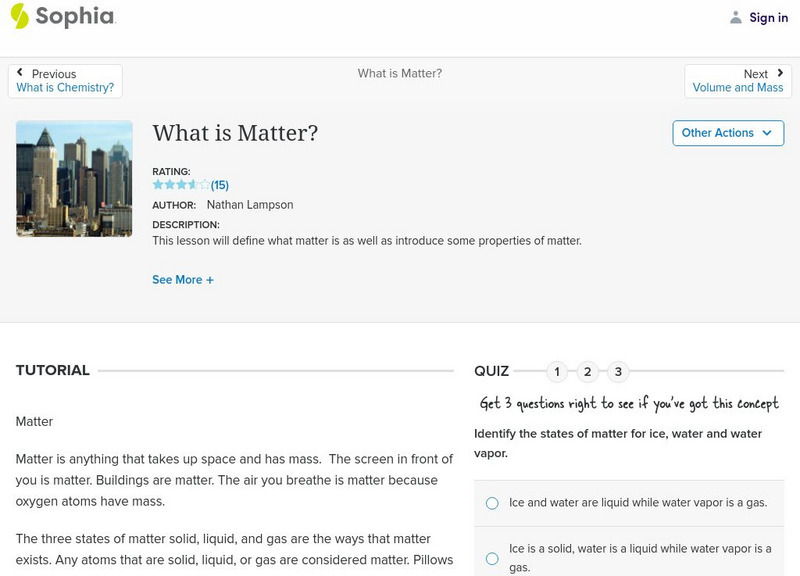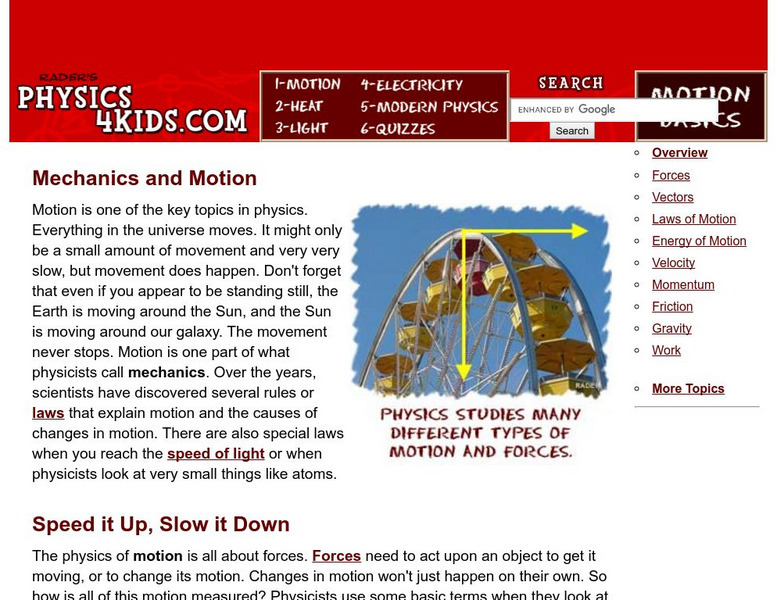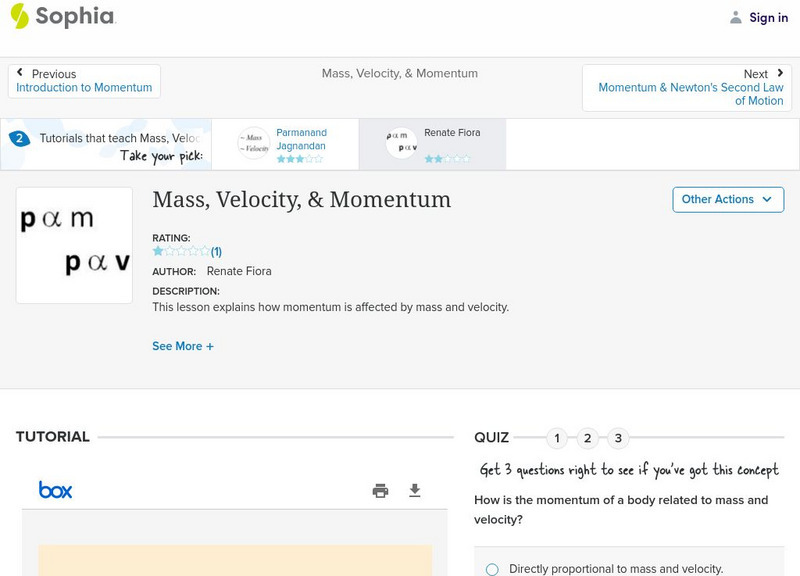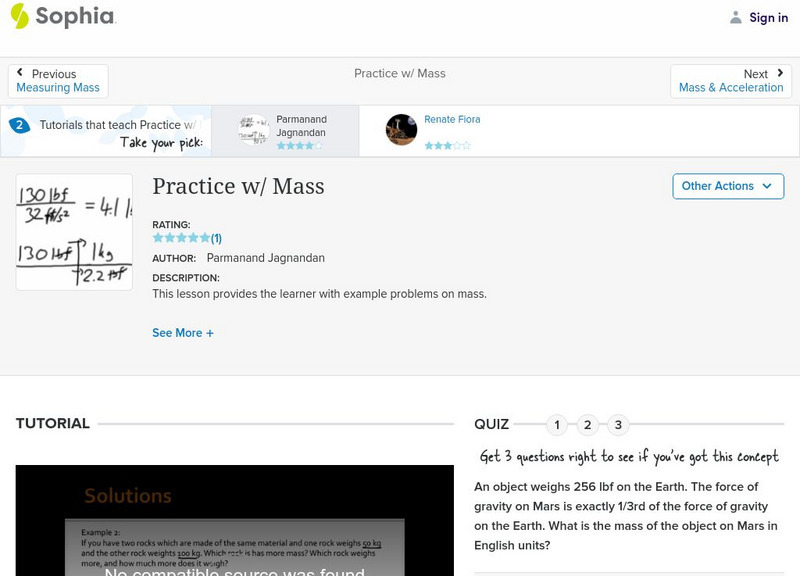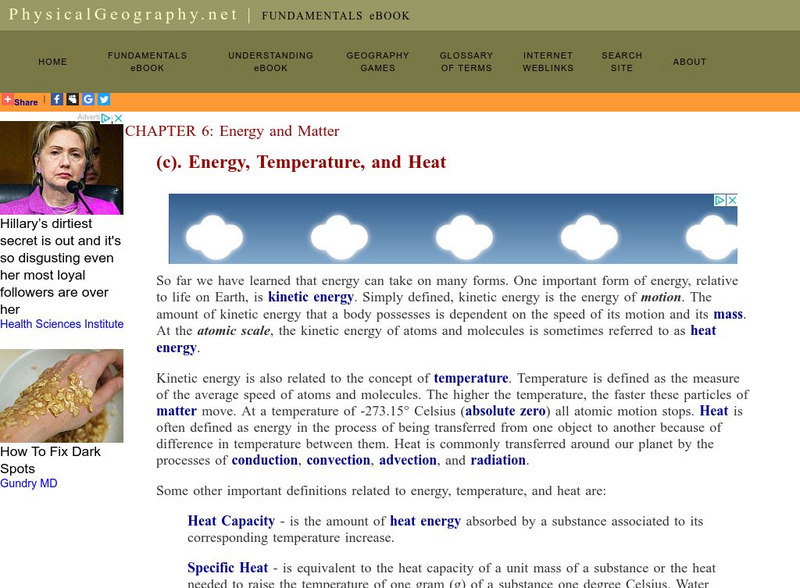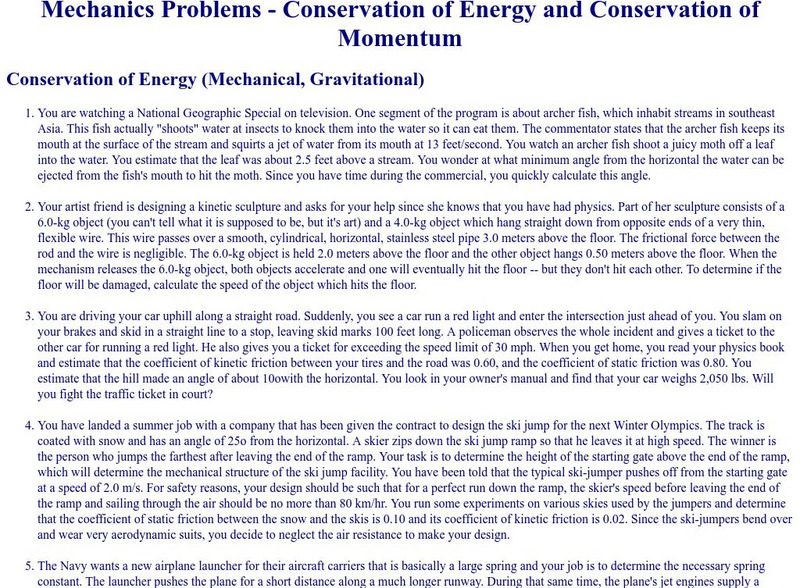Hi, what do you want to do?
Sophia Learning
Sophia: Volume and Mass
This lesson will describe the concepts of volume and mass and show how to calculate volume and mass.
Sophia Learning
Sophia: What Is Matter?
This lesson will define what matter is as well as introduce some properties of matter.
Physics4kids
Physics 4 Kids: Mechanics and Motion
Motion is one of the key topics in physics. Everything in the universe moves. It might only be a small amount of movement and very very slow, but movement does happen. Don't forget that even if you appear to be standing still, the Earth...
Physics4kids
Physics 4 Kids: Laws of Motion Quiz
Take this ten question multiple choice quiz on laws of motion.
Sophia Learning
Sophia: Mass, Velocity, & Momentum: Lesson 2
This lesson explains how momentum is affected by mass and velocity. It is 2 of 2 in the series titled "Mass, Velocity, & Momentum."
Sophia Learning
Sophia: Newton's First Law: Lesson 2
This lesson introduces Newton's First Law, that inertia causes objects at rest to remain at rest, and objects in motion to remain in motion. It is 2 of 3 in the series titled "Newton's First Law."
Sophia Learning
Sophia: Practice W/ Mass: Lesson 1
This lesson provides the learner with example problems on mass. It is 1 of 2 in the series titled "Practice w/ Mass."
Sophia Learning
Sophia: Practice W/ Mass, Force, & Acceleration: Lesson 1
This lesson provides the learner with examples on the relationships between mass, force, and acceleration. It is 1 of 2 in the series titled "Practice w/ Mass, Force, & Acceleration."
Ducksters
Ducksters: Physics for Kids: Force
Kids learn about force in the science of physics and the laws of motion including units and measurement. How to calculate force from mass and acceleration.
Ducksters
Ducksters: Physics for Kids: Kinetic Energy
Kids learn about kinetic energy in the science of physics. The energy of motion can be calculated using mass and velocity. The standard unit is the joule. How it is different from potential energy.
Ducksters
Ducksters: Physics for Kids: Mass and Weight
Kids learn about mass and weight in the science of physics and the laws of motion including units and measurement. What is the difference between mass and weight?
Ducksters
Ducksters: Physics for Kids: Momentum and Collisions
Kids learn about momentum and collisions in the science of physics and the laws of motion including units and measurement. Calculate momentum using mass times velocity.
Ducksters
Ducksters: Physics for Kids: Potential Energy
Kids learn about potential energy in the science of physics. The energy of position and state can be calculated using mass, gravity, and height. The standard unit is the joule. How it is different from kinetic energy.
Learn AP Physics
Learn Ap Physics: Physics B: Modern Physics
A site dedicated to help students prepare for the AP Physics B test. This specific site reviews Modern Physics including photons, photoelectric effect, atomic energy levels, The Michelson-Morley experiment, The Lorentz Transformation,...
Other
Fund. Of Phys. Geography/energy, Temperature, and Heat
A page describing (in part) the distinction between energy, temperature and heat. Includes a graphic illustrating the quantity of energy needed to transform water between various states. Methods of thermal energy transfer (convection,...
Other
Characteristics of Energy and Matter
A lengthy page from the Fundamentals of Physical Geography site. Energy is distinguished from matter, and the different forms of energy are identified and discussed. Four types of heat transfer (convection, advection, conduction,...
Other
Laws of Thermodynamics
A page from the Fundamentals of Physical Geography site. Identifies, describes and elaborates upon the first, second, and third laws of thermodynamics.
ClassFlow
Class Flow: Matter 2nd Grade
[Free Registration/Login Required] Interactive flipchart teaching the states of matter for a 2nd grade classroom containing four topics with several lessons in each one. The topics covered are: matter, solids, liquids, and gases....
ClassFlow
Class Flow: Measure Relationships
[Free Registration/Login Required] The teacher will use this lesson plan flipchart to review length, mass and capacity.
Math Is Fun
Math Is Fun: Metric Mass (Weight)
Grams, kilograms and tonnes are explained, and real life examples are given for each.
PBS
Pbs Teachers: Boats Afloat Experiment
Estimate how many pennies a flatboat made of aluminum foil will hold, then test your hypothesis.
ClassFlow
Class Flow: Introduction to Matter
[Free Registration/Login Required] This flipchart is a basic introduction to the properties of matter, mass, and weight. It discusses the physical properties of objects.
University of Minnesota
University of Minnesota: Conservation of Momentum
This site provides a set of four Physics problems dealing with the conservation of momentum principle.
Cornell University
Cornell University: Astronomy: Electromagnetism and Charge
This site from Cornell University provides a very short, very telling comparison of matter and charge. This is a good site to check out on the subject, with a chart diagram to help with further information.






